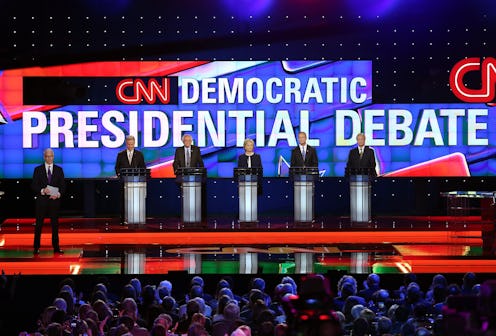News
Who Spoke The Longest At The Democratic Debate?
There were countless positive things about the first Democratic debate, including a major lack of name-calling and infighting. Candidates instead chose to focus on pressing issues, devoting their time to such topics as climate change and immigration reform. There is one major problem with the way the debate was formatted, however, and it has everything to do with on-air time. The event, held at the Wynn Las Vegas, ran for two hours and featured five candidates. Based off those numbers, if debate time were to be divided evenly, then each presidential hopeful would have had around 20 minutes to talk, at the absolute most. That wasn't the case Tuesday night, however. The candidate who talked the most at the debate was the same person leading the polls, speaking more than three times longer than the bottom-polling candidate.
Hillary Clinton clocked in 31 minutes and five seconds, while lowest-polling Democratic candidate Lincoln Chafee had less than 10 minutes to speak his piece. Former Vermont Sen. Bernie Sanders came the closest to Clinton, with a total of 28 minutes and five seconds. Martin O'Malley and Jim Webb came in with nearly 18 minutes and just over 15 minutes, respectively. Though it's relatively unsurprising that Clinton earned the most airtime, it came as a bit of a shock how poorly CNN moderator Anderson Cooper managed the talk time of each candidate.
This was a point that Webb frequently called out, to such an extent that he put his own speaking time in jeopardy. As Cooper was questioning candidates on U.S. involvement in Syria, Webb interrupted multiple times to say that he had been waiting "for about 10 minutes" to jump in and discuss this pressing issue. Cooper repeatedly responded by telling Webb that the rules of the debate were something he'd agreed upon, prompting the candidate to request that Sanders say his name while answering a question about economics so as to give Webb an opportunity to talk. Sanders failed to do so, and Webb spent even more time waiting to be called upon. Webb once again voiced his frustration:
The position on how this debate has occurred is kind of frustrating because unless somebody mentions my name I can't get into the discussion ... I'm trying to set a mark here so maybe we can get into a little more later on. This hasn't been equal time.
The next Democratic presidential debate is not for another month, giving Webb and his fellow candidates plenty of time to better prepare and attempt to stake out more talk time. The second debate will be held Nov. 14 at Drake University in Des Moines, Iowa, and maybe candidates will have a better time receiving equal on-air opportunities to talk that go 'round.
